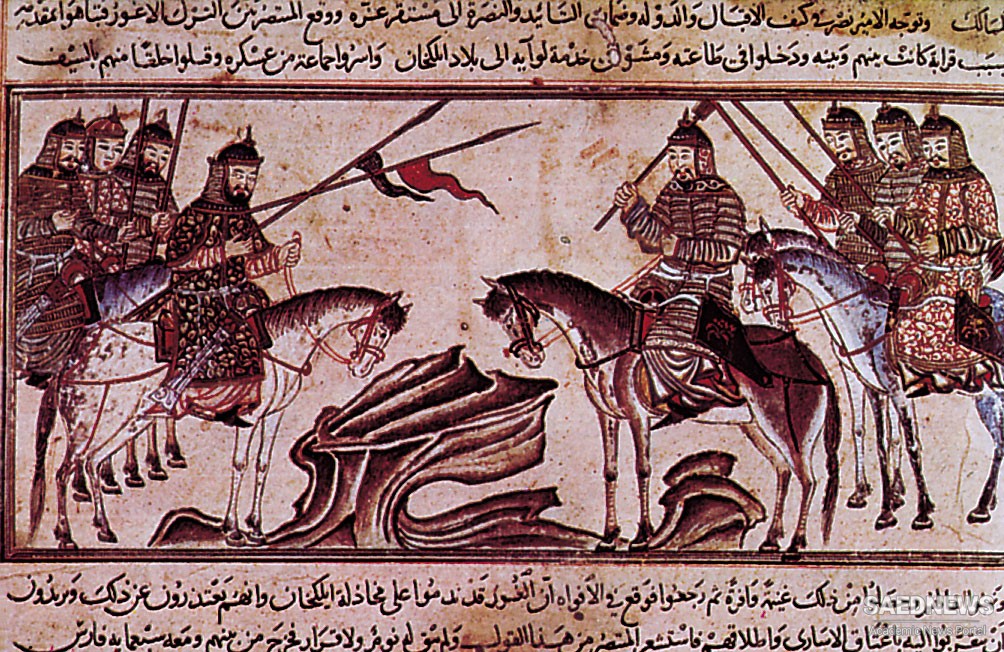After the 13th century, there is no mention of Zoroastrians in the area. The Mongol invaders are presumed to have exterminated them. Even the Christians of Tagrit, who were initially spared during the Mongol invasion of Mesopotamia, were sentenced to death in 1258 once the Mongols found out that they had not handed over the possessions of the Muslim victims. The anonymous author of the Chronicon ad AC 1234 Pertinens, said that the invaders had pity for no one, but he admitted they were particularly unrelenting towards the Muslims. The fact that the Mongols were putting an end to Muslim domination and granting religious freedom attenuated the fear of non-Muslims. The Christians were further reassured as they saw many coreligionists among the Mongols.
Consequently, the Christians seized the chance to gain the sympathy of the Mongol emperors. By the time Gengis Khan’s son Ugeday (1229-1241) sat on the throne, many Christians were dispatched from Mesopotamia and Persia to the Mongol court. The Eastern Syriac chronicles attest to the influence of the Nestorian physician Simeon on Ugeday. Simeon’s prestige among the Mongolshad even impressed the Armenian historian Kirakos of Gantzak. The Armenian chronicler’s sympathy for Simeon is not surprising as the latter had persuaded the Mongols not to harass the Christian population of Caucasus. According to Rashid al-Din, Ugeday was a merciful ruler who did not make distinctions between people of different creeds. He cites a series of instances during which Ugeday had spared the lives of Muslims who had infringed Mongol laws with regard to the use of rivers and the slaughtering of animals. Rashid al-Din also records that Ugeday distributed money to both Mongols and Muslims without discrimination. While Rashid al-Din aimed in his Jami' al-Tawarikh at demonstrating the Mongols’ benevolence towards the Muslims, he also furnishesuswith information explaining the non-Muslims’ preference for the Mongols.
The Mongol law or yasa was not a law particularly favourable to Christians, but it did not impose the restrictions of the Islamic law (sharia) on them. This generated a situation in which the Christians, although not in power, had hopes of attaining it. They had to call upon their political ingenuity in order to keep the Mongols’ sympathy. Ugeday’s son Guyuk (1246-1248) was brought up surrounded by Christians. His mother was a Christian, and so was his tutor Qadaq, the atabeg. He had also another Christian vizier called Chinqay. To observers in faraway Europe, Guyuk’s adherence to a religion other than Christianity appeared odd, and they formed the opinion that the fault for his non-conversion lay with his Christian officials, who had not put enough pressure on him to bring him to the right faith. It was this perception which prompted the Pope to send Guyuk a letter instructing him to accept baptism. Guyuk refused, believing that the world had to submit to him, not he to the religious authority of Rome. Despite his refusal to embrace Christianity, Guyuk clearly demonstrated his favour towards the Christians. Juzjani says that these people urged Guyuk to emasculate the Muslims, but a miracle prevented the Khan from implementing this plan. In another instance, a Muslim imam was brought to the court where his prophet was denigrated as just an ordinary man with a great sexual appetite. Rashid al-Din alleges that Guyuk had handed the affairs of his Empire to the two Christian viziers (Qadaq and Chinqay) and as a result the cause of Christians flourished. Key positions, such as the Command of the army in Iraq, had been given to Christians, and as one might expect Christians were also chosen as Mongol ambassadors to Western courts. King Louis IX (1226-1270) of France received two such Christian ambassadors who described to him the liberalism of Mongols towards Christians and told him that all Christians were exempted from taxation.


 Persia and Islamic Culture: Persian Share of Cultural Life of Islam
Persia and Islamic Culture: Persian Share of Cultural Life of Islam














































